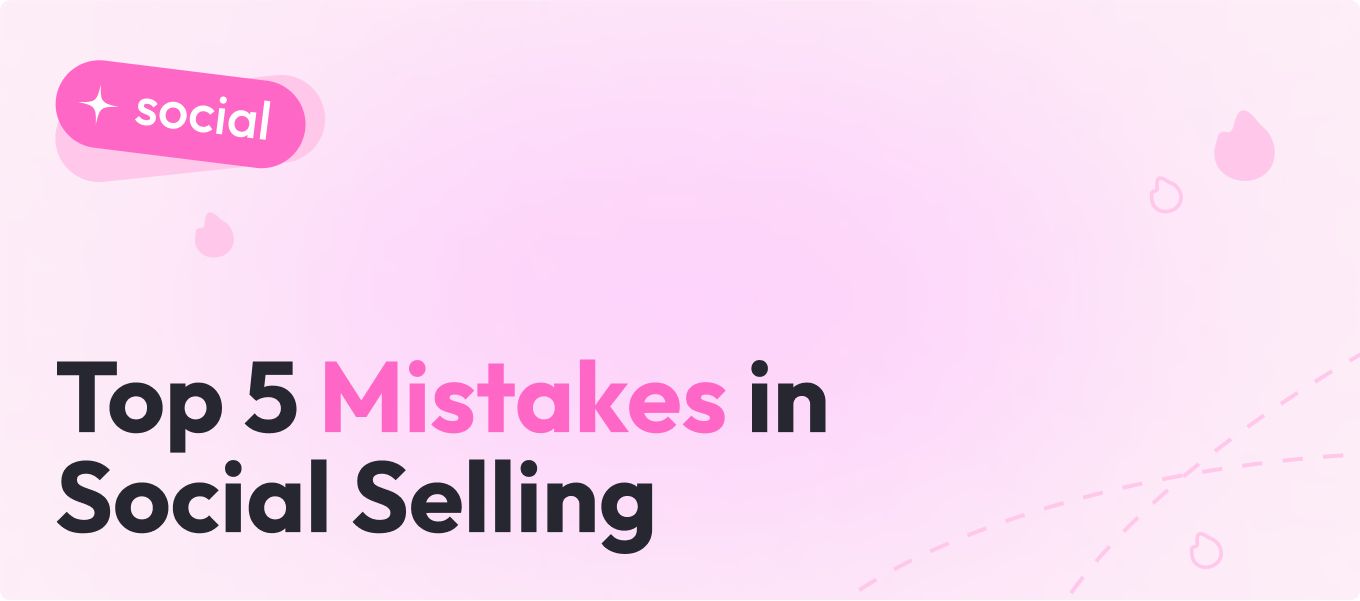- Blog
- /
- Popular articles
- /
- Top 5 Mistakes in Social Selling
Table of contents
Top 5 Mistakes in Social Selling

- #B2B
- #Customer Success
- #Sales
- 10 min read
- Posted:
Imagine your company has developed an outstanding product, but the challenge is effectively introducing it to the market. Traditional B2B selling tactics aren’t as effective anymore, which is where social selling comes in.
Social media offers a powerful avenue for building relationships and trust with customers, especially in industries like cybersecurity and fintech, where social selling can drive up to half of the revenue. However, there are pitfalls, such as selecting the wrong platforms or pushing sales too aggressively. In this article, we’ll explore how to avoid these common mistakes and build a successful social selling strategy.
Social Selling Essentials
Instead of spamming prospects across all platforms, focus on understanding your audience’s needs and build meaningful relationships. Social selling is about engaging with your prospects, identifying their pain points, and positioning your product as the solution at the right moment — without the pressure of a hard sell.
Unlike cold calling or traditional outreach, social selling is based on nurturing genuine, long-term relationships. It’s not about sending endless messages or flashy pitches but creating mutual trust and delivering value through your interactions.
In the following sections, we’ll dive deeper into the most common mistakes businesses make when implementing social selling and how to overcome them.
5 Mistakes in B2B Social Selling
Basically, social selling, done right, can provide excellent business opportunities and generate numerous leads. Thus, as a professional, your responsibility is to envisage various challenging scenarios in order to prevent them from happening. Forewarned is forearmed, after all.
Here are the main mistakes you may face when implementing your social selling strategy:
1. Using the Wrong Channel
Don’t just default to LinkedIn or the most popular networks. Identify where your decision-makers are active and focus your efforts there. While LinkedIn is a key platform for B2B, your audience might also engage on Facebook, Twitter, or even niche forums. Research thoroughly to avoid missing opportunities.
2. Ineffective Profile Content
Treating your profile as an advertising channel is a one-way ticket to being ignored by your prospects. Let’s just face it: endless promotional materials are irritating. Your profile should position you as a trusted authority, highlighting your expertise, showcasing recommendations, and sharing valuable content. Think of it as the first impression you leave on potential clients—make sure it conveys professionalism and relevance.
3. Overly Pushy Communication
Prospects don’t want to be bombarded with sales pitches right off the bat. Build relationships by engaging with content—leaving thoughtful comments, sharing relevant posts, and participating in discussions within industry groups. This approach establishes rapport and fosters genuine connections.
Additionally, seek out industry-related groups and communities where your prospects are active. By participating in discussions, you gain insight into their goals and challenges, allowing you to tailor your communication and build stronger, more personalized connections.
Note: If you communicate with a foreign audience, make certain that you are able to overcome the language barrier (if there’s any) and address all cultural aspects of your client.
4. Neglecting to Track KPIs
Simply counting likes or followers is not enough to gauge success. Implement a system to track meaningful KPIs—such as engagement rates, lead conversion, or ROI—through CRMs or other automation tools. Proper tracking will reveal what’s working and help you refine your social selling strategy.
5. Lack of Proper Training
Transitioning from traditional sales to social selling requires new skills. Even experienced salespeople need ongoing training to master this method. Learn from experts on how to leverage tools, create authentic relationships, and enhance your sales efforts through social platforms. According to LinkedIn, salespeople who excel at social selling have 45% more opportunities than those who don’t.
On a Final Note
In the modern B2B landscape, social selling is a must. Ignoring its potential means missing out on key opportunities. By understanding your audience, building trust, and avoiding these common mistakes, you can create a social selling strategy that delivers real results.
For those looking to take their social selling efforts to the next level, Leadguru provides the best tools to optimize your strategy, helping you automate, engage more effectively, and drive real results.
- #B2B
- #Customer Success
- #Sales
- 10 min read
- Posted: